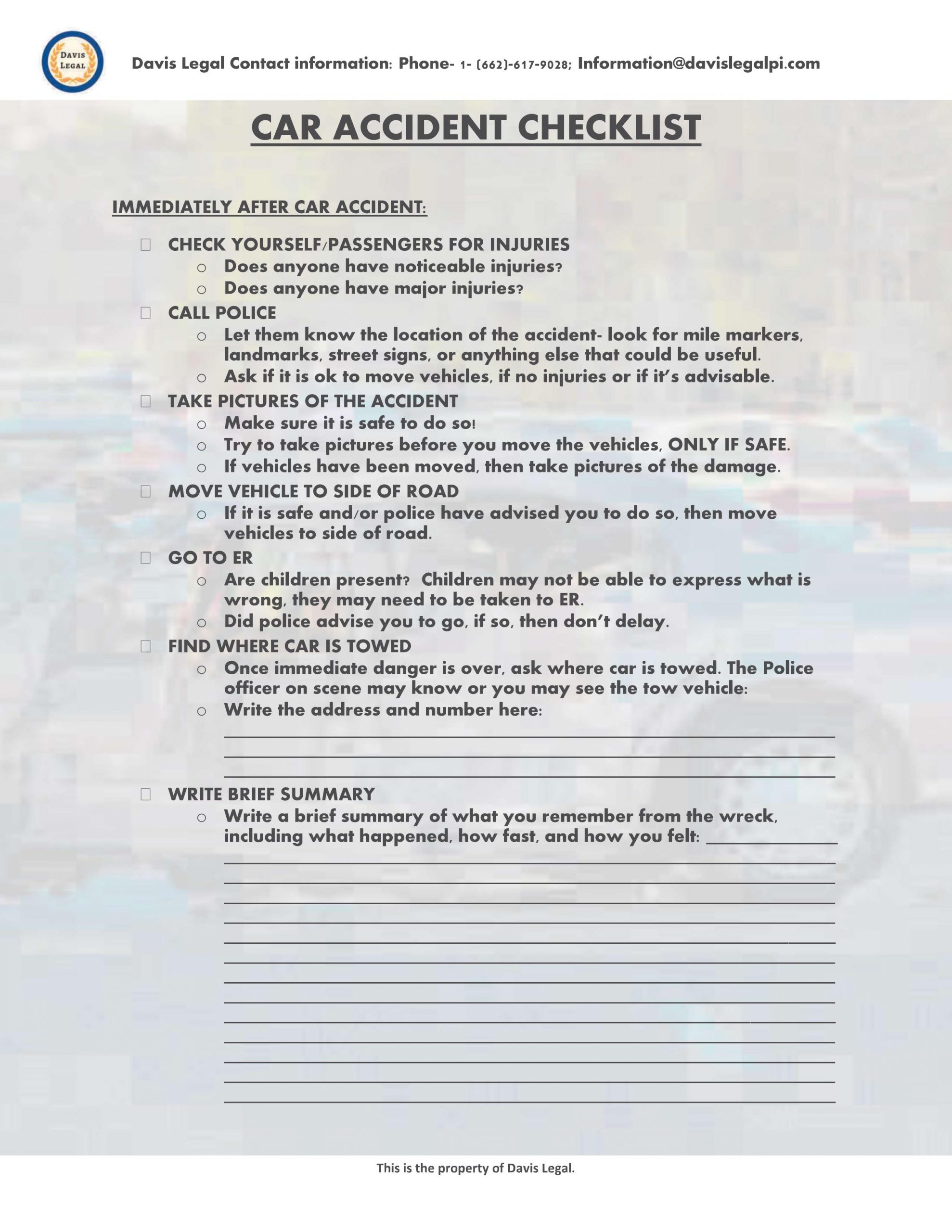Being in a car accident can shake anyone up, and it can make you feel nervous about what to do next. This article will give you an outline of the steps to take immediately after an accident and the weeks following and accident.
What to do immediately after the car accident?
1. Check yourself and any passenger for injuries.
Immediately following a crash, you should check for injuries, especially serious and critical injuries. This seems obvious, but with all the adrenaline from the accident, you may only see injuries versus actually feeling them. Note any bruising or cuts on your body. Next, and only after you have determined that you are physically cable of moving, check your passengers for injuries, especially children. They may not be able to tell you what is wrong, so check for bruising, swelling, or a general change in attitude. This initial step is very important; however, it does not mean that you are injury free. This step is to ensure that you and your passengers are not in critical condition.

2. Call the Police
Calling the police immediately helps them get there promptly, and it will help them obtain witnesses, if there are any. Also, the police can help access the severity of injuries. They will also help direct traffic and make sure no one else gets hurts. Also, I would suggest asking the dispatcher if the vehicles should be moved to the side of the road or remain where they are located. This could help stop others from wrecking and you getting hurt even more. If they say it is okay to move them, then ask where they should be moved too. Police also write the reports that determine who is at fault and the insurance information. Usually they will do a diagram of the accident.
3. Take Pictures of the Accident.
Before taking this step, make sure that it is safe to do so. Taking pictures of the accident could help determine who was at fault during the accident. HOWEVER, it is VERY important that SAFETY is the number #1 step. If taking pictures is not safe, then try to remember as much about the crash as possible. I would suggest jotting down a couple of quick notes so that you don’t forget. In some cases, it may help the officers determine who was at fault.
4. Move Vehicles to side of the Road.
SEE NUMBER TWO BEFORE PROCEEDING: If there are no injuries and it is safe to move the vehicles, then move them to the place indicated by the police. This helps insure no more accidents occur while waiting on the police or medical personal.
5. Go to the Emergency Room if necessary.
The police will most likely ask you or your passengers if they need to seek emergency care. Even in a minor accident, physical injuries could be more severe than thought, so really evaluate how you are feeling and what injuries are presenting themselves. Minor Children are more of a concern after accidents. In many cases, it is best to seek emergency medical care if the passengers are minor, especially those that cannot speak. If the police suggest you go, then they probably have established that you need to seek the care. Also, if you are experiencing severe pain, then it should be checked out. If you are unsure about going to the ER, then taking a couple of hours to calm down may help put the severity into perspective. If you are feeling pain and discomfort, then at a minimum get it checked out by your primary care physician.
6. Find out where your car is being towed too.
If the damage to your vehicle is severe enough, then it will probably be towed. Make sure to find out where it is being towed too, and this will help you and the insurance company get the vehicle fixed faster.
7. Write of brief summary of what happened.
When you and your passengers are in no physical danger, get out a piece of paper and quickly write a summary of what happened. As time progresses, you may forget details. Writing it down shortly after the accident will be more accurate than several months later, and this summary will help jog your memory later if it is needed.

What to do 1 week after a car accident?
1. Reevaluate yourself for injuries
Unfortunately, some injuries do not present themselves for several weeks after a car accident. Some symptoms may even take 2 weeks before they are noticeable. It is important that you re-evaluate yourself for physical injuries and mental injuries. I would suggest keeping a journal of symptoms, even in a minor accident. If injuries, bruising, or the like start popping up, then you might want to get checked out by a doctor.
2. Get the Police Report
Get the police report from the policing agency that handled the accident. Most of the time you can find it on the internet, and I suggest googling, “Where to find police report in ____________ county.” This police report will have the information you need to determine who is at fault, if they had insurance, and the insurance information.
3. File a claim with the At-fault insurance.
Once you have the Police report, you should be able to find the at-fault insurance’s information: call the insurance to start a claim. Many times, the insurance company will cover property damage as well as medical bills, so starting the claim early gets an open line to the insurance company.
4. Start the process of getting your vehicle fixed.
The insurance company may or may not have a specific person in your area that they require to fix the property. However, it could be a good strategy to get a couple of estimates of your own that way you know exactly what you are looking for in the insurance company’s estimates.
What to do 1 Month after a car accident?
1. Follow Doctor’s Orders
Even though the wreck is behind you, it doesn’t mean that you are completely healed. Continue to follow the Doctor’s orders regarding treatment.
2. Continue to evaluate symptoms
Sometimes mental injuries may take longer to show up, like PTSD, make sure that you continue to journal your symptoms and re-evaluate mental and physical pain. Keeping a record of these will be extremely helpful in getting proper treatment for all of your injuries.
**Attorney Shannon Davis is a licensed attorney in Arkansas and Tennessee. The information on this page should not be construed as legal advice. This is for informational purposes only. Also, by reading this post NO attorney-client relationship has been established.**





